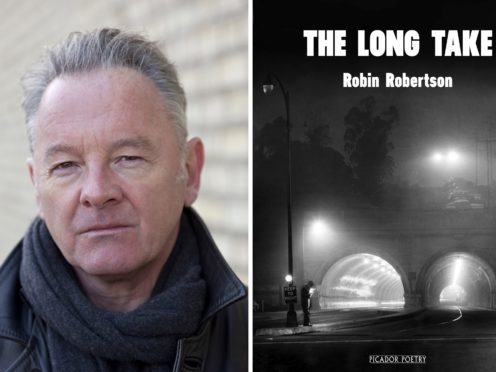A Scottish poet has won the 2019 Walter Scott Prize for Historical Fiction.
Robin Robertson becomes the first Scot and first poet to win the £25,000 award in its 10-year history for his book The Long Take.
Set in the great American cities after the Second World War, the book features a combination of verse and prose likened to that of Sir Walter Scott by the judges.
Upon accepting his award, Robertson, originally from the north-east coast but now living in London, said he had started as a poet and then moved into narrative fiction “by accident”.
He added The Long Take itself – which was longlisted for the 2018 Man Booker Prize – also started as a poem but became something longer.
The judges said: “The prize is always hard-fought and this year was no exception, but this novel exerted a very particular magnetic force, drawing us back again and again, each time marvelling anew.
“The Long Take recounts the inner journey of Canadian veteran Joe Walker as he travels from New York to Los Angeles and San Francisco attempting to rebuild his life after living through the horrors of war in Europe.
“In poetry of the utmost beauty, Robin Robertson interweaves themes from the great age of black and white films, the destruction of communities as cities destroy the old to build the new, the horrors of McCarthyism and the terrible psychological wounds left by war.
“Robertson shows us things we’d rather not see and asks us to face things we’d rather not face.
“But with the pulsing narrative drive of classic film noir, the vision of a poet, and the craft of a novelist, The Long Take courageously and magnificently boosts the Walter Scott Prize into its next decade.”
Congratulations, Robin Robertson, winner of the 10th #WalterScottPrize for Historical Fiction for THE LONG TAKE (@picadorbooks) pic.twitter.com/TNH5l3Y53X
— Walter Scott Prize (@waltscottprize) June 15, 2019
Other titles on the 2019 shortlist were A Long Way From Home by Peter Carey, After The Party by Cressida Connolly, The Western Wind by Samantha Harvey, Now We Shall Be Entirely Free by Andrew Miller, and Warlight by Michael Ondaatje.
The judges added: “It’s 10 years since the spectacular inauguration of the Walter Scott Prize, with Hilary Mantel’s Wolf Hall our first winner.
“The prize was founded both to acknowledge the part historical fiction plays in our literary landscape and to broaden and deepen the meaning of the term ‘historical fiction’ itself.
“Since then, many of the finest writers in English have explored historical themes in increasingly original ways, making the task of choosing a winner ever more difficult.
“It seems right that in our 10th anniversary year we should celebrate this originality by awarding the prize to a novel written in compelling narrative verse.”
